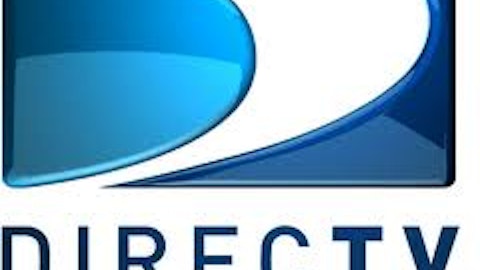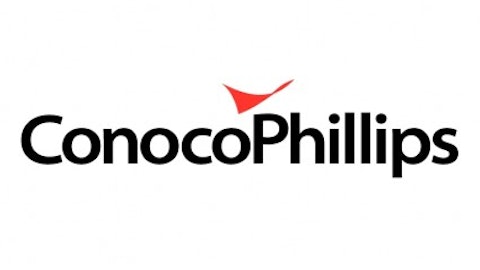A few weeks ago, CBS Corporation (NYSE:CBS) and Time Warner Cable (NYSE:TWC) took their disagreement over carriage fees to another level, as each firm’s existing carriage fee agreement expired, effectively blacking out Time Warner Cable (NYSE:TWC) subscribers from viewing the network.
Since then, Valuentum has seen really no signs of the companies coming to any sort of agreement. The Federal Communications Commission warned on Aug. 9 that, if the two firms didn’t reach an agreement, the government could get involved and force a resolution . Such an event would be an incremental negative to CBS Corporation (NYSE:CBS) because Valuentum doubts the FCC would see a reason why consumers should be forced to pay more for a network they can otherwise access for free.
How is viewership trending?
CBS Corporation (NYSE:CBS) won last week’s national ratings war, but reported that it lost about 46,000 viewers (last week’s average viewers: 5.55 million), or less than 1% of its total audience. Therefore, either Time Warner Cable (NYSE:TWC)’s 3.2 million subscribers weren’t watching CBS Corporation (NYSE:CBS) in the first place, or they resorted to using the traditional TV antennae. Valuentum tends to believe they simply hopped over to the antennae since it really isn’t a large inconvenience for many viewers.
On the flip side of the situation, CBS Corporation (NYSE:CBS) local viewership has experienced a fairly steep decline in the wake of the blackout. Viewership for KCBS-TV in Los Angeles declined 33% for the 5 p.m. hour and 25% for the 11 p.m. hour from the previous week . That’s a large swing for a relatively stable news market, and a decline in viewership impacts local station revenue. Smaller, local advertisement spending may shift toward stations with strong local viewership, and away from the CBS affiliates. Whether this will have a large impact on CBS Corporation (NYSE:CBS)’ top or bottom line remains to be seen.
Who’s hurting most?
Though we have heard much from individuals on both sides of the battle, it is hard to quantify where the balance of power lies. Though some consumers have left Time Warner Cable (NYSE:TWC) for competitors such as DIRECTV (NASDAQ:DTV), Valuentum thinks it is hard to say if the blackout caused the change or simply provided a catalyst for those who were going to switch services anyway.
If the CBS blackout is causing inflated and unmanageable subscriber churn, Time Warner Cable (NYSE:TWC) will be forced to accept higher retransmission fees. However, if churn remains relatively in-line with historical rates and expectations, then there is no pressure on Time Warner Cable (NYSE:TWC) to accept higher fees. In fact, if CBS’ ratings are only down marginally and Time Warner is not losing customers, then what incentive is there for a deal?
For CBS, an incremental viewer is positive for overall viewership, but it also provides a nice revenue stream ($12/yr x 3.2 million customers = $38 million) as well as superior local viewership (it seems). For Time Warner, not having CBS simply makes options such as DIRECTV (NASDAQ:DTV) and Dish Network marginally more appealing. If this is the case, we’d anticipate the carriage fees to remain similar to where they are today.
However, it’s still a bit too early to tell whether or not people are really affected by the CBS blackout. For one, there may be a large difference between how consumers react to not being able to watch “Mike & Molly” reruns versus not being able to watch a favorite NFL football team during the first week of the upcoming season. If the FCC doesn’t intervene, and we see no agreement reached, the NFL season could be the catalyst that decides who caves.
Valuentum’s take
Though the argument may seem relatively small, Vauentum thinks the future of retransmission fees will have a large impact on which part of the industry captures the greatest economic rent (the greatest piece of the industry profit pie). If Time Warner caves to higher fees because it needs the programming, then we think the content owners such as CBS and Disney will be the winners, while content distributors such as Dish, DIRECTV (NASDAQ:DTV), Time Warner, and Netflix will be net-losers (over the long haul).
At this point, Valuentum tends to believe the FCC will side with the content distributors since limiting carriage fee increases will almost certainly be a net-positive for consumers. Let’s also remember that the unbundling of content may be significantly more expensive for consumers than it would be for bundled content. Oftentimes, the goal of regulation is to protect consumers, and they are undoubtedly the loser with higher retransmission fees.
Valuentum’s favorite idea in the space remains DIRECTV (NASDAQ:DTV). We think its valuation (currently discounted relative to peers) reflects exaggerated fears surrounding the “cutting the cord” phenomenon. Nor do we believe the market is accurately valuing the firm’s growing Latin American business. Churn in PanAmerica remains low at just 1.33%, and we think subscriber growth should continue to grow at a solid clip . A growing middle class and a lack of competition in the content distribution space leave DIRECTV (NASDAQ:DTV) well-positioned to become a major player. DIRECTV (NASDAQ:DTV) already has the second largest share in Brazil, a market that could more than double in size in the coming decades .
Limited or no growth in carriage costs will be a marginal positive for DirecTV. At this time, we believe shares of the firm are worth $80, and we hold the name in the portfolio of Valuentum’s Best Ideas Newsletter.
The article What’s Going on in the Time Warner-CBS Battle? originally appeared on Fool.com is written by RJ Towner.
RJ Towner has no position in any stocks mentioned. Valuentum holds shares of DirecTV in the portfolio of its Best Ideas Newsletter. The Motley Fool recommends DirecTV.
Copyright © 1995 – 2013 The Motley Fool, LLC. All rights reserved. The Motley Fool has a disclosure policy.





